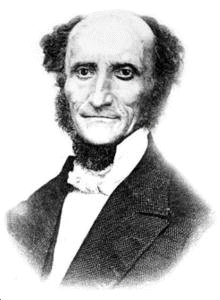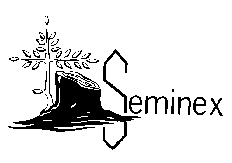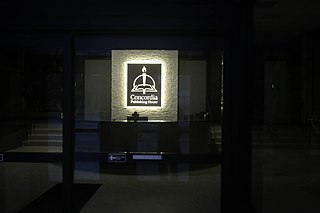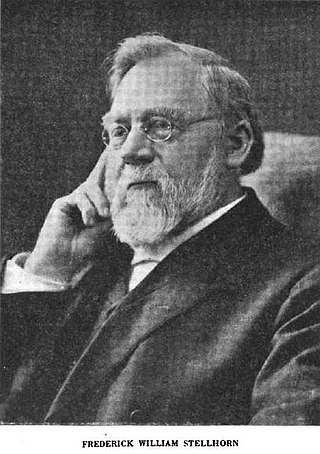
The Lutheran Church – Missouri Synod (LCMS), also known as the Missouri Synod, is a traditional, confessional Lutheran denomination in the United States. With 1.8 million members, it is the second-largest Lutheran body in the United States, behind the Evangelical Lutheran Church in America. The LCMS was organized in 1847 at a meeting in Chicago, Illinois, as the German Evangelical Lutheran Synod of Missouri, Ohio, and Other States, a name which partially reflected the geographic locations of the founding congregations.

Carl Ferdinand Wilhelm Walther was a German-American Lutheran minister. He was the first president of the Lutheran Church – Missouri Synod (LCMS) and its most influential theologian. He is commemorated by that church on its Calendar of Saints on May 7. He has been described as a man who gave up his homeland for the freedom to speak freely, to believe freely, and to live freely, by emigrating from Germany to the United States.

Concordia Seminary is a Lutheran seminary in Clayton, Missouri. The institution's primary mission is to train pastors, deaconesses, missionaries, chaplains, and church leaders for the Lutheran Church–Missouri Synod (LCMS). Founded in 1839, the seminary initially resided in Perry County, Missouri. In 1849, it was moved to St. Louis, and in 1926, the current campus was built.

The Book of Concord (1580) or Concordia is the historic doctrinal standard of the Lutheran Church, consisting of ten credal documents recognized as authoritative in Lutheranism since the 16th century. They are also known as the symbolical books of the Evangelical Lutheran Church.

Seminex is the widely used abbreviation for Concordia Seminary in Exile, which existed from 1974 to 1987 after a schism in the Lutheran Church–Missouri Synod (LCMS). The seminary in exile was formed due to the ongoing Fundamentalist–Modernist Controversy that was dividing Protestant churches in the United States. At issue were foundational disagreements on the authority of Scripture and the role of Christianity. During the 1960s, many clergy and members of the LCMS grew concerned about the direction of education at their flagship seminary, Concordia Seminary, in St. Louis, Missouri. Professors at Concordia Seminary had, in the 1950s and 1960s, begun to utilize the historical-critical method to analyze the Bible rather than the traditional historical-grammatical method that considered scripture to be the inerrant Word of God.

Friedrich Conrad Dietrich Wyneken was a missionary pastor in the United States. He also served for fourteen years as the second president of the Lutheran Church–Missouri Synod, and helped found Concordia Theological Seminary.

Abraham Calovius was a Lutheran theologian, and was one of the champions of Lutheran orthodoxy in the 17th century.
Paul L. Maier is an American historian and novelist. He has written several works of scholarly and popular non-fiction about Christianity and novels about Christian historians. He is the former Russell H. Seibert Professor of Ancient History at Western Michigan University, from which he retired in 2011, retaining the title of professor emeritus in the Department of History. He previously served as Third Vice President of the Lutheran Church–Missouri Synod.

Jaroslav Jan Pelikan Jr. was an American scholar of the history of Christianity, Christian theology, and medieval intellectual history at Yale University.

Concordia Publishing House (CPH), founded in 1869, is the official publishing arm of the Lutheran Church–Missouri Synod (LCMS). Headquartered in St Louis, Missouri, at 3558 S. Jefferson Avenue, CPH publishes the synod's official monthly magazine, The Lutheran Witness, and the synod's hymnals, including The Lutheran Hymnal (1941), Lutheran Worship (1982), and Lutheran Service Book (2006). It publishes a wide range of resources for churches, schools, and homes and is the publisher of the world's most widely circulated daily devotional resource, Portals of Prayer. Its children's books, known as Arch Books, have been published in millions of copies. Concordia Publishing House is the oldest publishing company west of the Mississippi River and the world's largest distinctly Lutheran publishing house.

Oswald Carl Julius Hoffmann was an American clergyman and broadcaster who was best known as a speaker for The Lutheran Hour, a long-running radio program affiliated with the Lutheran Church–Missouri Synod (LCMS). During his time on the Lutheran Hour, the weekly broadcast was heard on 1,200 stations in the U.S. and in thirty other nations.
Lutheran orthodoxy was an era in the history of Lutheranism, which began in 1580 from the writing of the Book of Concord and ended at the Age of Enlightenment. Lutheran orthodoxy was paralleled by similar eras in Calvinism and tridentine Roman Catholicism after the Counter-Reformation.
This is a selected list of works by and about Martin Luther, the German theologian. The emphasis is on English language materials.

KFUO is a non-commercial AM radio station licensed to Clayton, Missouri and serving Greater St. Louis. It has a Christian radio format. KFUO is one of the oldest continuous operating Christian radio stations in the United States, with its first broadcast on October 26, 1924. Owned and operated by The Lutheran Church–Missouri Synod (LCMS), its radio studios and offices are in the LCMS headquarters in Kirkwood, Missouri.

Robert David Preus was an American Lutheran pastor, professor, author, and seminary president.
Lutheranism is a major branch of Protestantism, identifying primarily with the theology of Martin Luther, the 16th-century German monk and reformer whose efforts to reform the theology and practices of the Catholic Church launched the Protestant Reformation.
William Frederick Beck was an American Lutheran minister best known for his biblical translation, The Holy Bible, An American Translation.
Frederick William Danker was a Christ Seminary–Seminex Professor Emeritus of New Testament at the Lutheran School of Theology at Chicago, Illinois. Danker was a noted New Testament scholar and the pre-eminent Koine Greek lexicographer for two generations, working with F. Wilbur Gingrich as an editor of the Bauer Lexicon starting in 1957 until the publication of the second edition in 1979, and as the only editor from 1979 until the publication of the 3rd edition, updating it with the results of modern scholarship, converting it to SGML to allow it to be easily published in electronic formats, and significantly improving the usability of the lexicon, as well as the typography.

Frederick William Stellhorn, an American Lutheran theologian, was born in Brüninghorstedt, a community in Warmsen the Landkreis of Hannover, in Lower Saxony (Niedersachsen), Germany.
John Hall Elliott was an American biblical scholar and Professor Emeritus of Theology and Religious Studies at the University of San Francisco. A founding member of the Context Group, his scholarship and teaching examine the Bible through interdisciplinary, cross-cultural and ecumenical lenses.












